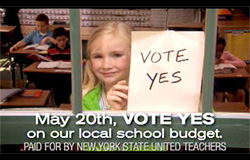 The second time was the charm for most districts after the statewide June 17 school budget revote. NYSUT President Dick Iannuzzi heralded the pass rates as good news and thanked New Yorkers for their commitment to education.
The second time was the charm for most districts after the statewide June 17 school budget revote. NYSUT President Dick Iannuzzi heralded the pass rates as good news and thanked New Yorkers for their commitment to education.
Voters were asked to reconsider school spending plans in 35 districts where the budgets had failed on the first try - 24 passed while 11 others were defeated, bringing the total number of districts facing austerity spending plans to 28.
"Parents and community members continue to affirm that public education is heading in the right direction," said Iannuzzi. "Just as important, by exercising their right to vote, they show taxpayers want a say in how their local schools are run and how their tax dollars are spent."
"We believe that parents and other New Yorkers want to continue to make their own decisions about their property taxes and not give up local control over school funding to Albany," Iannuzzi said, referencing a proposal for an arbitrary tax cap that would erode the practice of annual budget votes.
To help ensure success at the polls, NYSUT Executive Vice President Alan Lubin noted local unions built coalitions with parent and community groups and used phone banks, lawn signs and word of mouth to build support for their school budgets. The statewide union launched a $1 million statewide television advertising campaign, Lubin said.
In those districts where even the revised budget failed, the schools have no choice but to adopt a contingency plan which this year caps district spending increases at 3.36 percent and limits spending on equipment, capital improvements and other areas. Seventeen districts, including East Ramapo, Canajoharie, Newburgh, Hyde Park and Chenango Valley adopted austerity budgets after initial school budget defeats in May.
Because Foundation Aid increases are excluded from the contingency budget cap, some districts will be able to adopt a contingency plan that spends beyond the cap. Legislation sponsored Sen. Stephen Saland, R-Poughkeepsie, would also exclude fuel costs from the contingency cap.